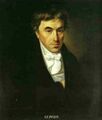Template:Selected anniversaries/December 22: Difference between revisions
No edit summary |
No edit summary |
||
| Line 59: | Line 59: | ||
||1897: Vojtěch Jarník born ... mathematician and academic ... ... the namesake of Jarník's algorithm for minimum spanning trees. Jarník worked in number theory, mathematical analysis, and graph algorithms ... also: he found tight bounds on the number of lattice points on convex curves, studied the relationship between the Hausdorff dimension of sets of real numbers and how well they can be approximated by rational numbers, and investigated the properties of nowhere differentiable functions. Pic: https://alchetron.com/Vojt%C4%9Bch-Jarn%C3%ADk | ||1897: Vojtěch Jarník born ... mathematician and academic ... ... the namesake of Jarník's algorithm for minimum spanning trees. Jarník worked in number theory, mathematical analysis, and graph algorithms ... also: he found tight bounds on the number of lattice points on convex curves, studied the relationship between the Hausdorff dimension of sets of real numbers and how well they can be approximated by rational numbers, and investigated the properties of nowhere differentiable functions. Pic: https://alchetron.com/Vojt%C4%9Bch-Jarn%C3%ADk | ||
||1898: Vladimir Fock born ... physicist and mathematician. | ||1898: Vladimir Fock born ... physicist and mathematician. Pic. | ||
||1905: | ||1905: Tommy Flowers dies ... engineer with the British Post Office. During World War II, Flowers designed and built Colossus, the world's first programmable electronic computer, to help solve encrypted German messages. Pic. | ||
||1903: Haldan Keffer Hartline born ... physiologist and academic ... co-recipient (with George Wald and Ragnar Granit) of the 1967 Nobel Prize in Physiology or Medicine for his work in analyzing the neurophysiological mechanisms of vision. Pic. | ||1903: Haldan Keffer Hartline born ... physiologist and academic ... co-recipient (with George Wald and Ragnar Granit) of the 1967 Nobel Prize in Physiology or Medicine for his work in analyzing the neurophysiological mechanisms of vision. Pic. | ||
Revision as of 07:44, 15 May 2019
1550: Philosopher and academic Cesare Cremonini born. His work will promote rationalism (against revelation) and Aristotelian materialism (against the dualist immortality of the soul) inside scholasticism.
1551: Explorer Cornelis de Houtman publishes "The Legend of Neptune Slaughter, a Tale of Monstrous Disaster from Beyond the Islands and the Oceans of the Furthest East."
1732: Inventor, engineer, and businessman Richard Arkwright born. Later in his life Arkwright will be known as the "father of the modern industrial factory system."
1765: Mathematician Johann Friedrich Pfaff born. He will work on partial differential equations of the first order Pfaffian systems, as they are now called, which will become part of the theory of differential forms.
1858: Composer Giacomo Puccini born. He will be called "the greatest composer of Italian opera after Verdi".
1887: Mathematician and theorist Srinivasa Ramanujan born. He will make substantial contributions to mathematical analysis, number theory, infinite series, and continued fractions, including solutions to mathematical problems considered to be unsolvable.
1894: The Dreyfus affair begins in France, when Alfred Dreyfus is wrongly convicted of treason.
1920: Lecture by monster ends in riot.
2016: Chromatographic analysis of Red Spiral 3 reveals "at least four, possibly five" previously unknown shades of red.









